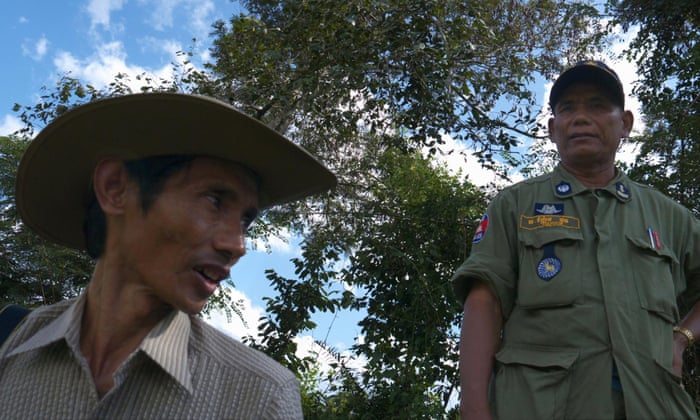British documentary I Am Chut Wutty has been watched tens of thousands of times online following the government ban

Footage from I Am Chut Wutty shows the activist (left) during a forest protest in Cambodia. Photograph: Fran Lambrick/Courtesy iamchutwutty.com
John Vidal
Thursday 21 April 2016 The Guardian
A documentary about the murder of a rainforest activist has been viewed tens of thousands of times online after being banned by the Cambodian government.
The film I Am Chut Wutty was due to be shown this week in a Phnom Penh cinema to coincide with the fourth anniversary of the killing of the environmentalist by an unidentified military police officer in April 2012.
But the Cambodian Department of Cinema and Cultural Diffusion refused the cinema a licence, stating that the British director had no permission to make the film.
The ban may have backfired, with sections of the Khmer language version of the film being viewed nearly 100,000 times in the last three days and private screenings reportedly being shown across Cambodia. An English version will be released next week.
Cambodian human rights and environment groups condemned what they said was suppression of the stories of people trying to save the country’s rainforest.
Fran Lambrick, the British co-director of the film, who first met Chut Wutty while researching community forestry in Cambodia for an Oxford University PhD in 2011, said that Cambodia’s forests were being destroyed at an alarming rate.
“Chut Wutty was a prominent activist and director of the Natural Resources Protection Group. His life work was to defend the rights of forest communities and speak out against the rampant deforestation that is destroying Cambodia’s natural heritage. We want to keep his words and his battle alive.”
Cambodia, along with Latin American countries such as Honduras, Guatemala and Brazil, is one of the most dangerous in the world for grassroots human rights and environmental defenders.
International rights groups say campaigners and community leaders have been arbitrarily detained and judicially harassed for protesting forest clearances, sand dredging and hydro electric dams.
Wutty was shot dead while taking two journalists to witness deforestion in the Cardamom mountain forests. According to one eyewitness, three military police arrived on motorbikes and Wutty was shot at the wheel of his Toyota Land Cruiser as he tried to drive away.
Chut Wutty’s colleague and friend, Leng Ouch, who this week received a Goldman award, has had his life threatened many times for investigating corruption within the forest industry.
In November 2015, a park ranger and a police officer were killed while patrolling forests for illegal logging and poaching.
Three young activists from the Mother Nature Cambodia group are currently being held in a cell for objecting to sand dredging, and community leader Ven Vorn has been jailed for participating in protests against a hydroelectric dam in the Areng Valley.
In response to growing threats to environmental activists, Lambrick, Leng and others have set up Not 1 More (N1M), a group campaigning to defend imprisoned and threatened environmental campaigners around the world.
“We are calling for the release of the three Mother Nature activists, San Mala, Sim Somnang, and Try Sovikea. They have been crammed in a cell for eight months with 15 people – less than 0.45 metres squared of space each, 20 hours a day,” said Lambrick.
Cambodia has one of the highest rates of deforestation in the world. Since 2001, hundreds of Economic Land Concessions have been handed out by the government and are widely blamed for driving illegal logging and giant plantations.
Voracious demand for luxury furniture in China is also fuelling forest destruction: Siamese rosewood trees are worth hundreds of thousands of dollars each, with prices reaching $50,000 (£35,000) per cubic metre.
Last week the Cambodian government announced that more than 1m hectares of natural forest will now be protected, including the embattled Prey Lang forest, one of the largest remaining lowland evergreen forests in south-east Asia.
But environmental groups warned that the government should actively stop illegal logging and encroachment rather than tacitly condoning their destruction.

No comments:
Post a Comment